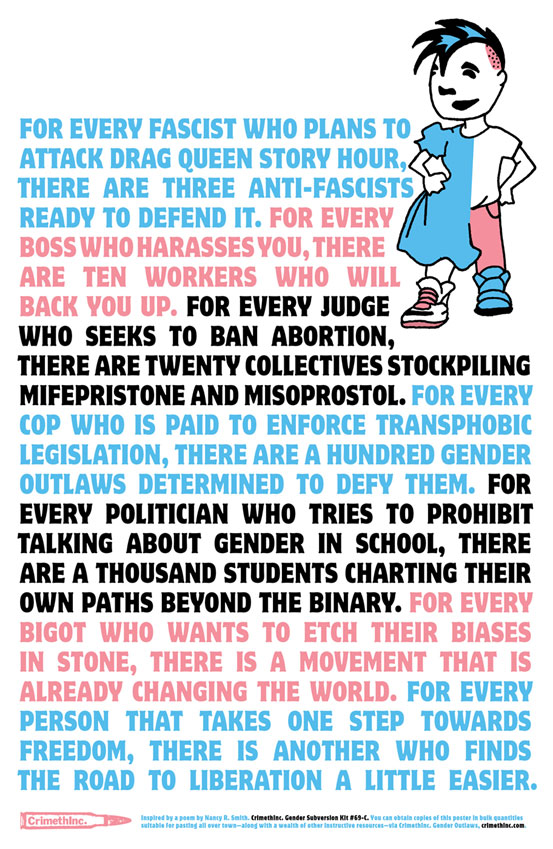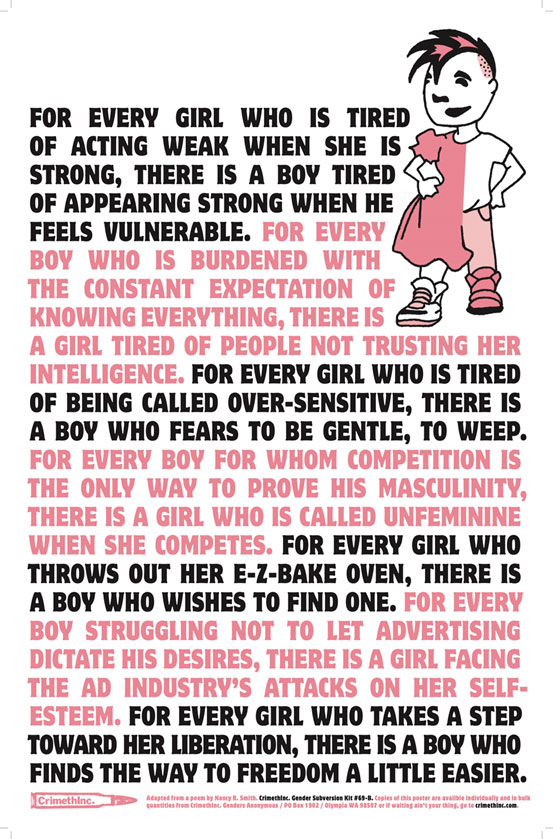

Order the posters at https://store.crimethinc.com/collections/posters
Struggles Over Gender Today
Today, nonbinary identities and gender-neutral pronouns have emerged from trans/queer subcultures and online communities into workplaces, schools, and public debates. Trans communities have received unprecedented visibility.
On the other hand, what had been a rising wave of conservative backlash has grown into a tsunami. It is no exaggeration to describe the reactionary program as gender fascism. As the popular saying goes, “First they ignore you, then they laugh at you, then they fight you, then you win.” The struggle for gender self-determination has reached the “then they fight you” stage. Today, access to abortion care has been severely restricted in large regions of the US, while hundreds of proposed laws target trans people, especially youth, with restrictions on medical care, participation in sports, bathroom access, legal documentation, entertainment and culture, and more. At the same time, heads of state are citing the preservation of gender roles among their chief justifications for full-scale wars.
Yet at the same time that reactionaries are attempting to use state power to crush gender non-conformity and eliminate reproductive autonomy, the identity politics that emerged from 20th century liberation struggles are experiencing a crisis.
The right-wing culture war offensive on the terrain of gender seeks to take advantage of this crisis. While the breadth of support for abortion rights worries Republican strategists who are concerned with their electoral prospects, the right is gambling that it can target trans people with impunity, seeing them as a small and politically less powerful demographic ripe for scapegoating. By framing their attacks as defenses against existential threats to children, the family, and the gender order itself, they have inflamed their base with a sense of mission that identity-based coalitions have not been able to overcome.
The same social changes that have uprooted fixed notions of gender and enabled more expansive ways of being have also destabilized models of organizing that relied on coherent notions of identity. We need new ways of understanding ourselves to fight the forces that divide and oppress us, new ways to conceptualize who we are and what we can become.
Abolition and Self-Determination
How might we approach the task of undoing gender, combining the best elements of gender abolition and gender self-determination? By identifying which aspects of gender need abolishing, we can propose some points of departure:
Abolish gender segregation—ensure that people of all genders have access to the same opportunities, resources, social spaces, and forms of agency.
Abolish fixed gender roles—break the association between certain traits and certain genders, demonstrating new constellations of the qualities and capabilities that are currently associated with one gender or another. As the original poster suggests, you can be strong without being a boy and sensitive without being a girl; while this sentiment is increasingly accepted today, how much further can we go towards breaking free of the fixed roles and binaries that organize our thinking about human beings?
Abolish gender hierarchies—End practices that privilege one gender over another, and those that value some qualities and capabilities over others because of the gender they are associated with. Hillary Clinton becoming president would not have served to qualify our society as feminist—if a person of any gender has to outdo all other contenders in demonstrating traditionally masculine characteristics in order to get a foothold in politics, and if all political institutions continue functioning according to patriarchal priorities and protocols, gender oppression remains in effect even if not everyone in a position of power is a man.
Abolish gender gatekeeping—Do away with the boundaries that control who can identify with any gender. Defending trans identity, gender nonconformity, and other departures from fixed binary gender represents a step towards this goal.
Abolishing these dimensions of gender can create the space for the free flourishing of all people outside of oppressive roles and identities. We can affirm both the creative impulses that lead millions of people today to define themselves in gendered terms outside of birth assignments and binaries, while also taking aim at the structural conditions that constrain our lives regardless of how we identify.
As anarchists, we believe that we can only be free when all of us are free, and that everything that expands the horizons of freedom for others will benefit us, too. Nowhere is this plainer than on the terrain of gender.
Reprinted from anarchist.news.org / crimethinc.com/
